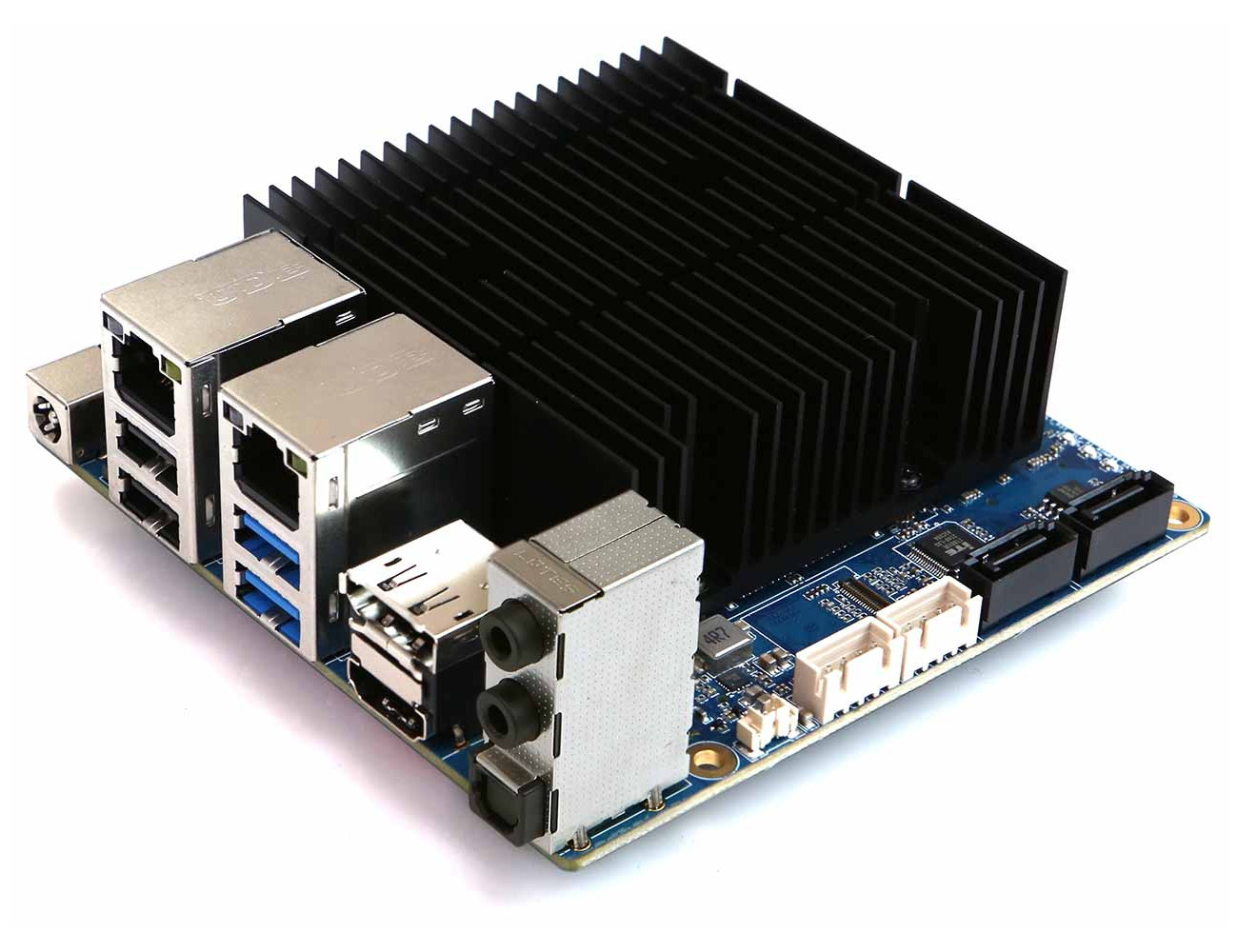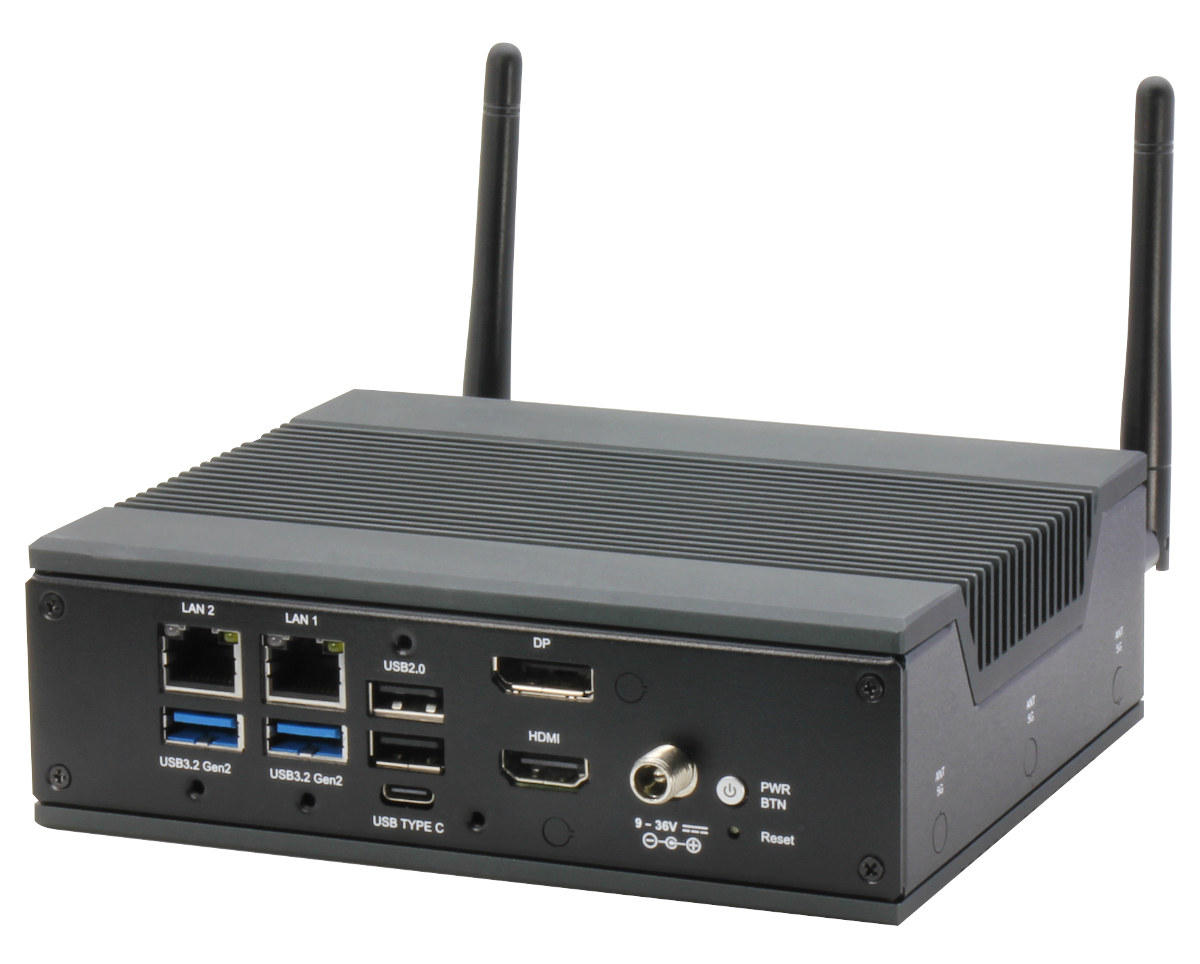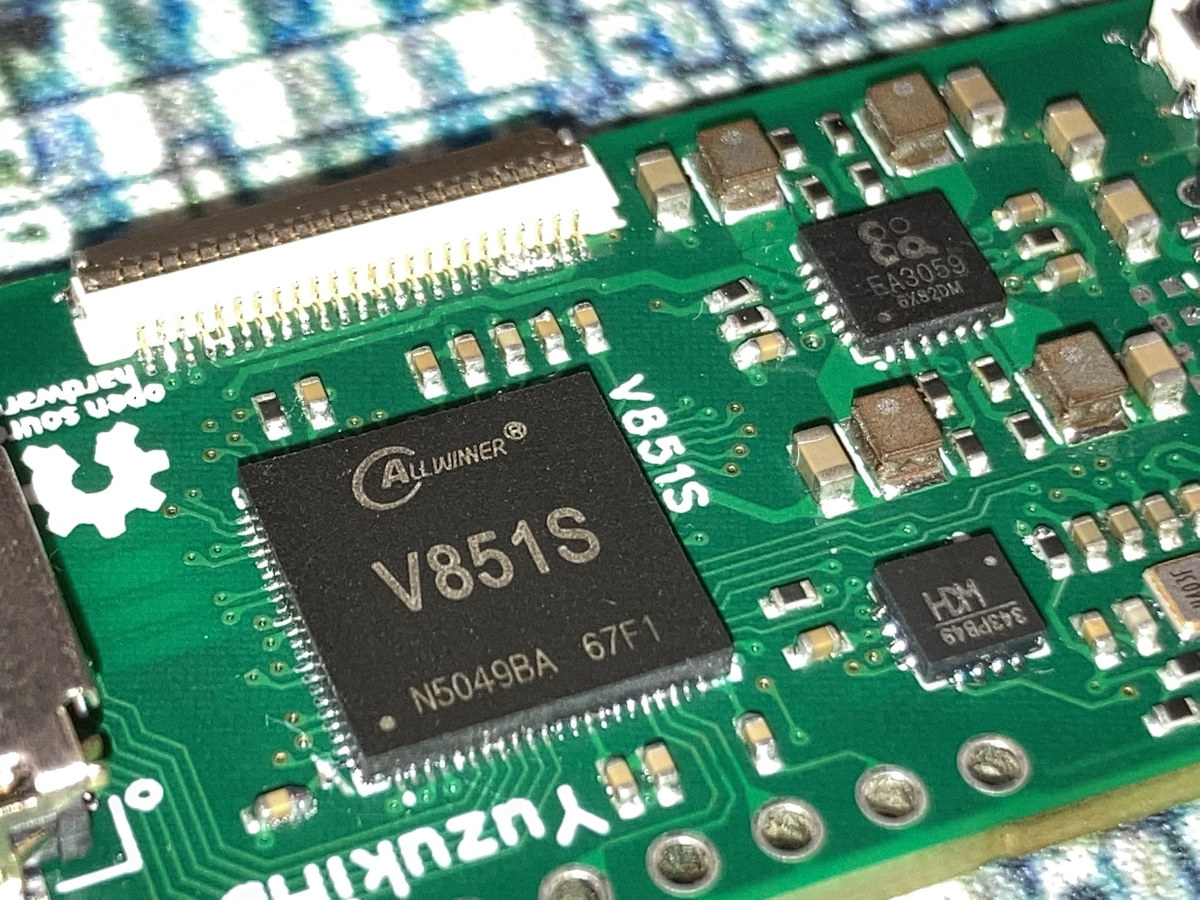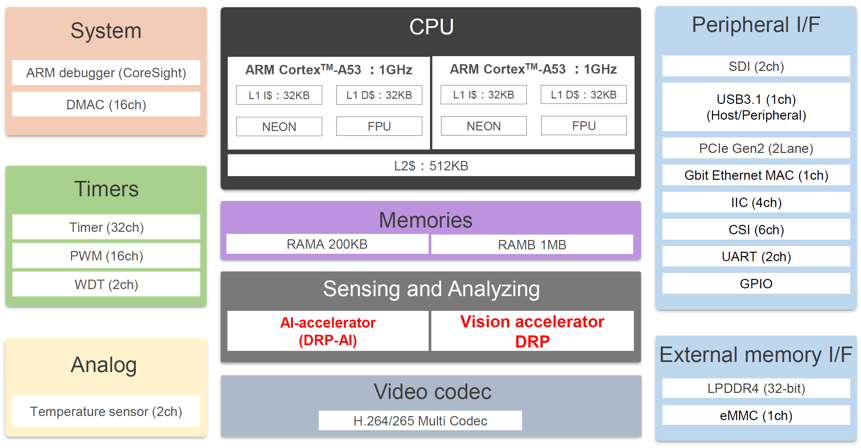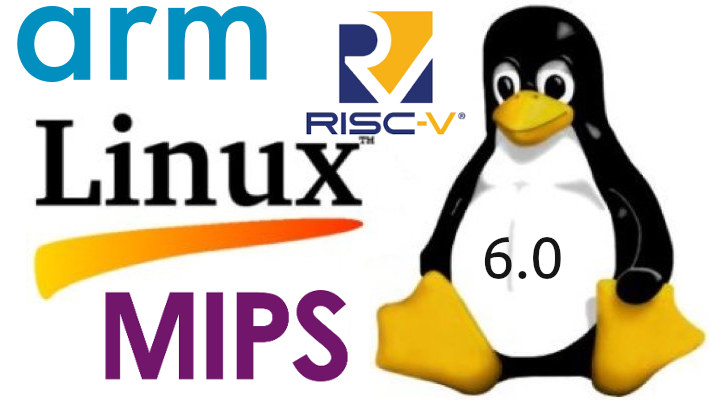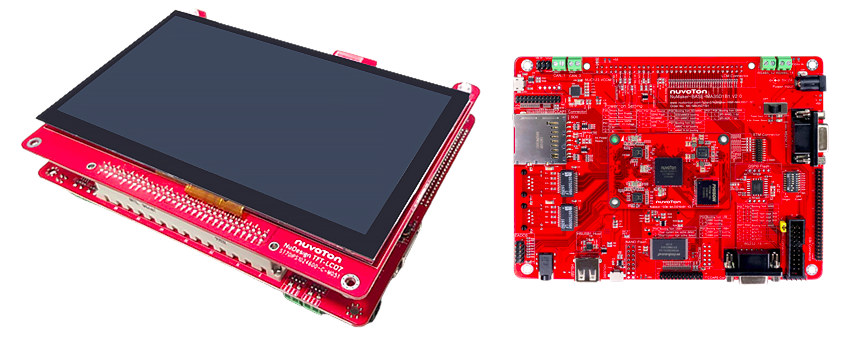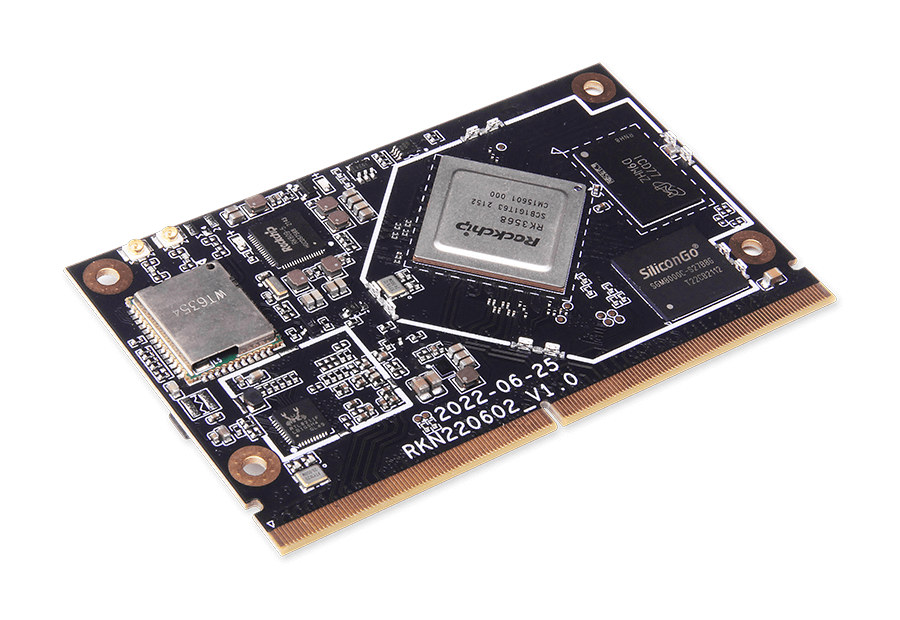There are now not one but two alternatives to the discontinued ODROID-H2+ SBC with the ODROID-H3 and ODROID-H3+ single board computers powered respectively by an Intel Celeron N5105 and Pentium N6005 Jasper Lake processor. Both new SBCs support up to 64GB RAM, significantly faster Intel UHD graphics, an M.2 PCIe Gen 3 socket, and keep the same port assignment with two 2.5GbE ports, two SATA ports, as well as two USB 3.0 and two US 2.0 ports. ODROID-H3/H3+ specifications: SoC ODROID-H3 – Intel Celeron N5105 quad-core Jasper Lake processor @ 2.0GHz / 2.9GHz (Turbo) with 24EU Intel UHD graphics @ 450 / 800 MHz (Turbo); 10W TDP ODROID-H3+ – Intel Pentium N6005 quad-core Jasper Lake processor @ 2.0GHz / 3.3GHz (Turbo) with 32EU Intel UHD graphics @ 450 / 900 MHz (Turbo); 10W TDP System Memory – Dual-channel SO-DIMM DDR4 memory (2933MT/s) supporting up to 64GB RAM in total Storage […]
ODROID-Go Ultra Amlogic S922X portable gaming console and devkit launched for $111
Hardkernel ODROID-Go Ultra (OGU) portable gaming console and devkit is powered by the same Amlogic S922X hexa-core Cortex-A73/A53 processor found in the company’s ODROID-N2+ SBC. The new model also adds a 16GB eMMC flash for faster storage and increases the RAM capacity to 2GB. The Korean company’s adventure with portable gaming consoles started with the ESP32-based ODROID-Go to celebrate its 10th birthday in 2018. At the time it looked like a side project, but the console was popular enough that they released their first Linux handheld game console with the ODROID-Go Advance (OGA) in 2019, and then the ODROID-Go Super (OGS) in 2020 with a larger 5-inch display, and both equipped with a Rockchip RK3326 quad-core Cortex-A35 processor. The new ODROID-Go Ultra is based on the same design as the OGS model, but with a serious jump in performance, and the ability to support more demanding emulators. ODROID-Go Ultra specifications: […]
UP Element i12 Edge embedded computer is equipped with Intel’s NUC 12 Compute Element
AAEON’s UP Bridge the Gap has announced the UP Element i12 Edge fanless embedded computer based on the Intel NUC 12 Compute Element and designed for the autonomous mobile robot (AMR) and industrial automation markets. The computer is fitted with NUC 12 Compute Element equipped with 12th generation Alder Lake hybrid processor from Celeron 7350 to Intel Core i7-1255U hybrid processor, supports up to 32GB LPDDR5 memory, NVMe support, offers three Ethernet ports including one 2.5GbE, several USB ports, two RS232/422/485 interfaces, a DIO header, and more. UP Element i12 Edge specifications: System-on-module – Intel NUC 12 Compute Element with: Alder Lake SoC (one or the other) Intel Core i7-1255U 10-core processor with 2x Performance cores @ up to 4.7 GHz, 8x Efficiency cores @ up to 3.5 GHz, Intel Iris Xe Graphics; PBP: 15W Intel Core i5-1235U 10-core processor with 2x Performance cores @ up to 4.4 GHz, 8x Efficiency […]
Allwinner V851S/V851SE low-cost camera SoC embeds 64MB DDR2, a 0.5 TOPS NPU
Allwinner V851S/V851SE is a single-core Arm Cortex-A7 SoC with a RISC-V core, an H.265/H.264 video encoder, and a 0.5 TOPS NPU designed for Smart IP cameras with support for features such as human detection and crossing alarms. Both processors ship with 64MB DDR2 memory, and feature USB, Ethernet, and SDIO interfaces, but the V851S is designed for systems with a display, while the V851SE targets traditional headless IP cameras. Both processors are pretty similar, but here are the key differences between Allwinner V851S: Networking – 10/100 Mbps Ethernet port with RMII interface GPIO – 6x ports (PA, PC, PD, PE, PF, PH) Display LCD Parallel RGB, Serial RGB, i8080, BT656 2-lane MIPI DSI SPI – 4x SPI and Allwinner V851SE: Networking – SIP 100 Mbps EPHY GPIO – 5x ports (PA, PC, PE, PF, PH) Display – Not supported SPI – 3x SPI That means the Allwinner V851S requires an […]
Renesas RZ/V2MA microprocessor embeds AI & OpenCV accelerators for image processing
Renesas has launched the RZ/V2MA dual-core Arm Cortex-A53 microprocessor with a low-power (1TOPS/W) DRP-AI accelerator and one OpenCV accelerator for rule-based image processing enabling vision AI applications. The MPU also supports H.265 and H.264 video decoding and encoding, offers LPDDR4 memory and eMMC flash interfaces, as well as Gigabit Ethernet, a USB 3.1 interface, PCIe Gen 2, and more. The RZ/V2MA microprocessor targets applications ranging from AI-equipped gateways to video servers, security gates, POS terminals, and robotic arms. Renesas RZ/V2MA specifications: CPU – 2x Arm Cortex-A53 up to 1.0GHz Memory – 32-bit LPDDR4-3200 Storage – 1x eMMC 4.5.1 flash interface Vision and Artificial Intelligence accelerator DRP-AI at 1.0 TOPS/W class OpenCV Accelerator (DRP) Video H.265/H.264 Multi Codec Encoding: h.265 up to 2160p, h.264 up to 1080p Decoding: h.265 up to 2160p, h.264 up to 1080p Networking – 1x Gigabit Ethernet USB – 1x USB 3.1 Gen1 host/peripheral up to 5 […]
Linux 6.0 release – Main changes, Arm, RISC-V, and MIPS architectures
Linux 6.0 has just been released by Linus Torvalds: So, as is hopefully clear to everybody, the major version number change is more about me running out of fingers and toes than it is about any big fundamental changes. But of course there’s a lot of various changes in 6.0 – we’ve got over 15k non-merge commits in there in total, after all, and as such 6.0 is one of the bigger releases at least in numbers of commits in a while. The shortlog of changes below is only the last week since 6.0-rc7. A little bit of everything, although the diffstat is dominated by drm (mostly amd new chip support) and networking drivers. And this obviously means that tomorrow I’ll open the merge window for 6.1. Which – unlike 6.0 – has a number of fairly core new things lined up. But for now, please do give this most […]
Nuvoton NuMicro MA35D1 Arm Cortex-A35/M4 microprocessor to power Linux edge IIoT gateways
Novoton NuMicro MA35D1 microprocessor features two Arm Cortex-A35 cores, one Arm Cortex-M4 real-time core, and two Ethernet interfaces for Linux-based edge IIoT gateway. The SoC also is offered in variants supporting external DDR memory or integrated up to 512MB RAM, 154 or 208 GPIOs, and an optional “Enhanced ADC”. The MA35D1 also comes with a TFT interface for up to 1920×1080 displays, several hardware security features, and the company says the microprocessor facilitates Tiny AI/ML for edge computing despite not integrating an AI accelerator. Nuvoton NuMicro MA35D1 key features and specifications: CPU sub-system 2x Cortex-A35 cores running at up to 800 MHz Cortex-M4 real-time core at up to 180 MHz Memory sub-system On-chip 384 KB SRAM (Cortex-A35 256 KB + Cortex-M4 128 KB) Multi-Chip Package (MCP) DDR up to 512MB External DDR interface for MA35D16A087C SKU Storage Quad SPI NAND Flash Controller Secure Digital Host Controller (SDHC) Display and Video […]
Geniatech unveils SMARC 2.1 compliant Rockchip RK3568 system-on-module
We’ve seen Rockchip RK3568 system-on-modules before, but the Geniatech SOM-3568-SMARC core board is the first to comply with the SMARC 2.1 standard with a 314-pin MXM connector exposing the many I/Os from the quad-core Cortex-A55 processor. The module comes with up to 8GB RAM, 128GB eMMC flash, integrates a WiFi and Bluetooth module as well as two Gigabit Ethernet transceivers, and is designed to be used in advanced NVRs, cloud terminals, industrial automation, IoT applications, digital signage, and more. Geniatech SOM-3568-SMARC specifications: SoC – Rockchip RK3568 quad-core Cortex-A55 processor @ 2.0 GHz with Arm Mali-G52 2EE GPU with support for OpenGL ES 1.1/2.0/3.2, OpenCL 2.0, Vulkan 1.1, 1 TOPS NPU for AI acceleration, 4Kp60 H.265/H.264/VP9 video decoding, and 1080p100 H.265/H.264 video encoding; 22nm process System Memory – 2GB, 4GB or 8GB DDR4 Storage – 32GB, 64GB, or 128GB eMMC 5.1 flash Networking 2x RTL8211F Gigabit Ethernet PHY WT6354 wireless module […]


